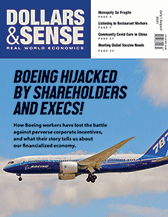Two Cents
Letter from a Former Boeing Software Engineer
This article is from Dollars & Sense: Real World Economics, available at http://www.dollarsandsense.org

This article is from the
September/October 2021 issue.
Subscribe Now
at a 30% discount.
This letter from a former Boeing software engineer was published in the September/October issue of Dollars & Sense. —Eds.
Dear Professor Duggan:
I read with great interest your article on Boeing that appeared in the July/August issue of Dollars & Sense (Marie Christine Duggan, “Boeing Hijacked by Shareholders and Execs!”).

As a retired software engineer and mathematician who worked at Boeing, I would like to share an additional perspective. Successful software development requires a work environment in which one can both collaborate and concentrate. In particular, there are many times when sustained attention to detail is absolutely essential. This can only take place in a workplace that is largely free of distractions. Unfortunately, this was not possible at Boeing. Its offices were mainly very crowded and noisy. As a result, the risk of making mistakes or overlooking critical details was very high. Furthermore, having such workplaces made it more difficult for Boeing to attract and to retain the best people.
It is easy to measure the cost of office space, but it is much more difficult to measure the loss of productivity that is a consequence of having offices in which it is impossible to concentrate. Boeing upper management chose to set minimal standards for office space, under the illusion that it was saving money by doing so.
I believe this is a topic that deserves much more emphasis. As someone who developed software that involved a significant amount of complex mathematics, it was clear to me that having a distraction-free work environment was extremely important. I brought this issue to the attention of Boeing management many times, and with few exceptions, they chose to ignore the problem.
Sincerely,
Richard Fuhr, Seattle, Wash.
Did you find this article useful? Please consider supporting our work by donating or subscribing.
